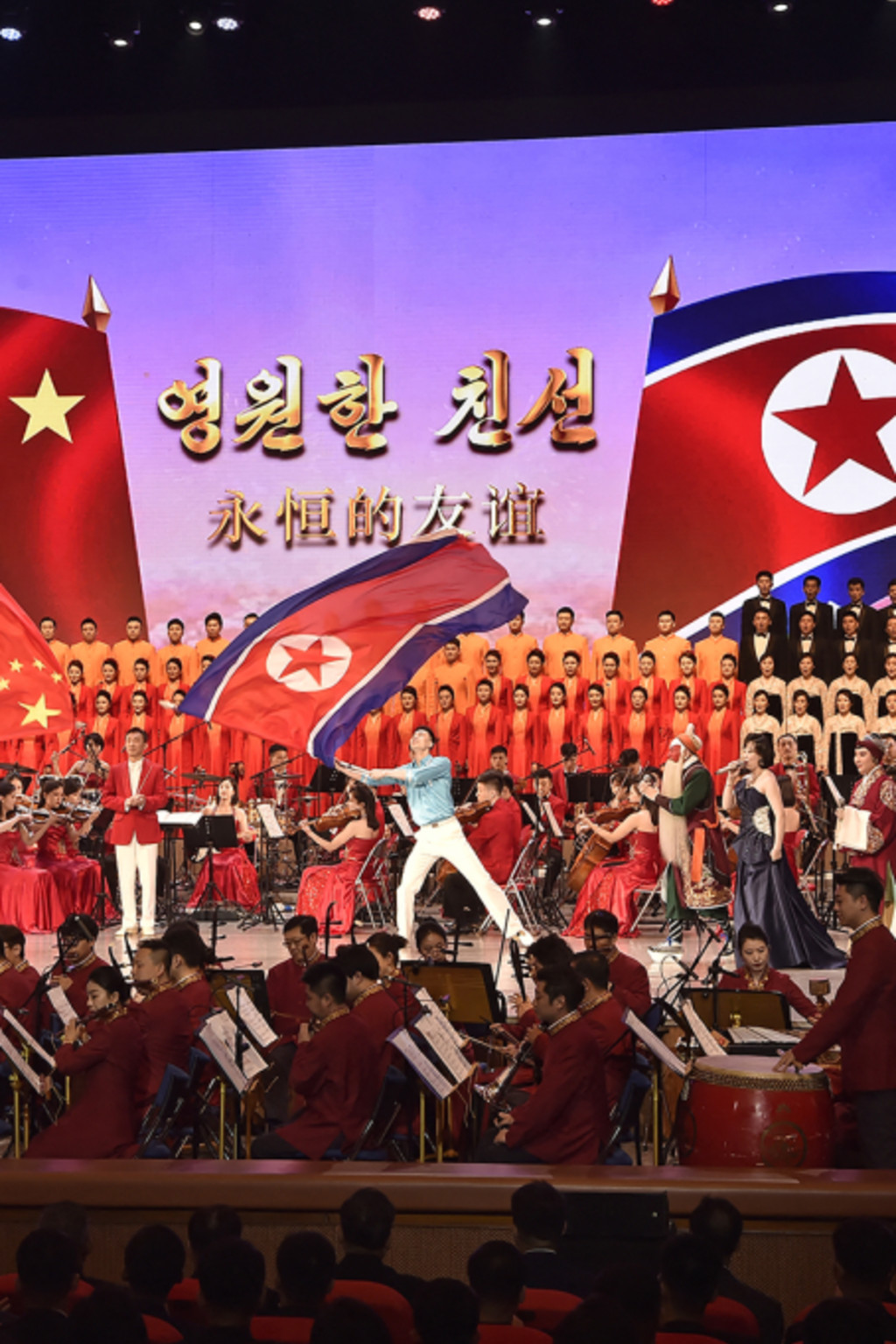
The China-North Korea Relationship
Published
Updated
Complex dynamics between the two Asian nuclear powers are shifting once again as North Korea deepens ties with Russia and the U.S.-China rivalry intensifies.
- China and North Korea have long-running economic and security ties, including a mutual defense treaty, but the relationship has often been strained.
- Beijing wants to preserve stability on the Korean Peninsula and has struggled to tame Pyongyang’s nuclear weapons ambitions.
- North Korea’s recent defense pact with Russia has complicated China’s greater strategy of balancing ties with the United States and its allies in the region.
What are backgrounders?
Authoritative, accessible, and regularly updated Backgrounders on hundreds of foreign policy topics.
Who Makes them?
The entire CFR editorial team, with regular reviews by fellows and subject matter experts.
Introduction
China and North Korea have had ties for seventy-five years, forming a bond in Northeast Asia not long after both communist-led states were established in the aftermath of World War II. Although the relationship remains stable to some extent, it has also weathered perennial strains and an enduring mutual distrust. Many analysts say that North Korea today is more of a liability for China than a valuable ally.
China has often struggled to balance its priorities with North Korea, chief of which is maintaining stability, given that Pyongyang has greatly expanded its missile and nuclear programs since the early 2000s. The United States and its East Asian allies, including Japan and South Korea, have viewed these threats with growing alarm. In recent years, North Korea has forged deeper military ties with Russia amid its war against Ukraine, raising new concerns for both the United States and China.
What is the history of China and North Korea’s relationship?
China and North Korea established formal relations in 1949, emerging as new communist countries in the years following World War II. China supported North Korea in the Korean War (1950–53), and the two countries signed a mutual defense treaty in 1961, China’s only one to date. (North Korea’s only other, with the Soviet Union, was signed days after.)
Despite their geographic proximity and ideological similarities, the China-North Korea relationship experienced periodic tensions as North Korea attempted to leverage China vis-à-vis Russia during the Cold War. Strains in the 1960s over the application of socialism, Pyongyang’s desire for self-reliance (juche), and China’s growing economic links with South Korea became more visible during the 1980s. When Pyongyang conducted its first nuclear weapon test in 2006, Beijing called it a “flagrant and brazen” violation of international consensus and responded by backing UN sanctions. With this sanctions resolution and those that followed, Beijing signaled a shift in tone, from diplomatic support to punishment, that carried through the 2010s and eventually resulted in unilateral sanctions on North Korea’s missile and nuclear testing program in 2017.
In 2018, Beijing sought to mend ties [PDF] with Pyongyang in a move that some experts suggest was motivated by the surprise announcement of a summit between North Korean leader Kim Jong Un and U.S. President Donald Trump earlier that year. Chinese President Xi Jinping and Kim reiterated a commitment to denuclearization during their first talks in March 2018, and Xi supported Kim’s willingness to hold a dialogue with the United States. Xi was welcomed to Pyongyang in 2019, the first time a Chinese leader had visited North Korea since 2005. In 2021, the two countries renewed their sixty-year-old mutual defense pact for another twenty years. However, relations between the two countries have recently become frosty as North Korea has embraced Russia as an alternative strategic partner.
What’s the status of their economic relationship?
China’s economic support is critical for North Korea, which remains one of the world’s poorest and most isolated countries and has come under tightening international sanctions in recent years. Experts say China is keen to keep North Korea economically dependent. Beijing has been Pyongyang’s top trading partner for more than two decades, accounting for roughly 98 percent of North Korea’s official total imports and exports in 2023.
Beijing also provides aid directly to Pyongyang, primarily food and energy assistance. North Korea has repeatedly faced severe droughts and flooding, which threaten its food supply. Famine ravaged the country in the 1990s, killing anywhere from a half million people to more than 3 million, according to Western analyses [PDF]. Today, UN agencies estimate that more than 40 percent of the population—almost eleven million people—are undernourished. Food insecurity and related health concerns were further exacerbated by North Korea’s self-imposed isolation during the COVID-19 pandemic. In 2022, during the height of the pandemic, Kim refused vaccine offers from the UN-backed COVAX initiative and from China. North Korea rolled out vaccines later that year, however, and analysts speculated that China was likely the supplier.
China has also expanded physical links to North Korea. In 2015, it opened a bulk cargo and container shipping route to boost North Korea’s export of coal to China and established a high-speed rail route connecting the Chinese border city of Dandong to Shenyang, the provincial capital of China’s Liaoning Province, in the country’s northeast. The same year, the Guomenwan border trade zone opened in Dandong, aiming to bolster bilateral economic exchanges. These exchanges deteriorated during the COVID-19 pandemic when North Korea closed its borders.
What are China’s priorities with North Korea?
China has overlapping and sometimes conflicting interests on the Korean Peninsula, especially as dynamics in the region change. For instance, although China claims that it wants to see North Korea’s denuclearization to prevent a regional arms race or war, it vetoed sanctions in response to Pyongyang’s missile testing regime in 2022.
Maintain stability and influence. China deems stability on the Korean Peninsula a primary interest. Unlike those of his predecessors, Xi’s Korea policy is focused on preventing a Kim regime collapse and on avoiding a potential unwanted war in the region, which could undermine China’s security interests. Its support for North Korea, also a one-party authoritarian state, bolsters the geopolitical buffer between China and South Korea, a pluralist democracy that is also a U.S. treaty ally and home to around 28,500 U.S. troops. For its part, Pyongyang strongly supports a One China policy in Taiwan and Hong Kong and defends Beijing’s treatment of Uyghurs and other minorities in Xinjiang as a “remarkable achievement” of human rights.
Denuclearization. China has long maintained the position that North Korea’s reliance on nuclear weapons is destabilizing for the region but believes that denuclearization is not achievable in the short term. Even though China calls for peace and denuclearization simultaneously, it ignores requests from the United States and allies to use its leverage on North Korea to push for denuclearization, and the prospect of policy coordination has dwindled given that U.S.-China relations remain fraught. Chinese analysts view North Korea’s nuclear developments as a reaction to U.S. hostilities in the region and have called on the United States to improve its relationship with North Korea to help seed denuclearization talks.
Limit migrant flows. China wants to restrict the influx of irregular migrants and refugees from North Korea, particularly as the region experiences extreme weather and natural disasters exacerbated by climate change. Unofficial estimates of North Korean defectors living in China range from 50,000 to 200,000. (Separately, reports have revealed that as many as 40,000 North Korean workers have been sent by the government to work in Chinese factories to provide income for the state, which still faces strict sanctions.) Many escape through China before moving to other parts of Asia, including South Korea. China’s repatriation of North Koreans has consistently triggered condemnation from human rights groups. However, tightened border controls under Kim Jong Un have dramatically decreased the outflow of defectors.
What is the two countries’ military relationship?
China and North Korea’s 1961 mutual defense treaty commits the signatories to provide the other with military aid if they are attacked. This alliance is Beijing’s sole formal security commitment, and China has made clear in the past that it would protect North Korea if the United States and South Korea attacked first. However, Beijing has implied that its treaty obligations would not apply if Pyongyang initiates conflict and that Beijing would instead stay neutral. The defense agreement has never been invoked.
Despite their differences, some analysts believe that China and North Korea’s shared ideology and single-party rule motivates their military relationship. When the mutual defense treaty was renewed in 2021, North Korean media called the move a “powerful weapon” against imperialism and defending socialism. However, as North Korea allies itself more closely with Russia, China’s response has been muted. Beijing has been cautious to avoid direct involvement in Russia’s attack on Ukraine so that it can maintain economic ties with Europe.
How has the relationship been affected by recent developments in the region?
Souring North Korea-South Korea relations. North Korea has become increasingly confrontational with South Korea. Pyongyang abandoned its decades-long reunification efforts with Seoul in early 2024 and called the South a “hostile state” in a revision of its constitution. In response, the Chinese foreign ministry said that China has always supported the improvement of inter-Korean relations. In May 2024, China, Japan, and South Korea held a trilateral summit in Seoul, the first in more than four years. However, many regional experts observed that the meeting was largely symbolic.
Warming Russia-North Korea ties. Analysts say that China seeks to maintain stable ties with the United States and Europe and does not want to appear as if it’s becoming part of a trilateral axis with North Korea and Russia. However, U.S. officials report that China has been supporting Russia’s weapon manufacturing since its full-scale invasion of Ukraine in early 2022. North Korea has also supplied weapons, ammunition, and, more recently, soldiers to Russia, according to U.S. intelligence.
In June 2024, Russia’s president Vladimir Putin and North Korea’s leader Kim signed a mutual defense treaty, reviving language from their Cold War–era defense pact that was scuttled in the 1990s. Although experts say it is unlikely to be invoked, CFR senior fellow Stephen Sestanovich writes that the agreement signals that Russia is “intent on bringing down the U.S.-led international order by making common cause with China, Iran, and North Korea.” Beijing held ministerial talks with Seoul in June, coinciding with the Putin and Kim meeting and emphasized safeguarding peace and stability on the peninsula.
How has the United States viewed the China-North Korea relationship?
The U.S. official policy regarding North Korea remains complete denuclearization to ensure peace and prosperity in the Korean Peninsula. However, analysts are divided on how best to achieve this or, alternatively, whether the goal should be discarded. Many fear that if the United States were to accept North Korea as a nuclear power it would only embolden the Kim regime and encourage nuclearization in the region. Some see denuclearization as a first step; others view it as an end goal. Some believe it to be unrealistic and say Washington should focus instead on freezing Pyongyang’s nuclear program. Recent polls suggest that a large majority of South Koreans support acquiring their own nuclear weapons, a perspective partially driven by North Korea’s advancing military capabilities but also by China, which polls reveal is seen as the next biggest threat to South Korea.
Washington has tried to punish Pyongyang by imposing sanctions on firms and individuals that contribute to Pyongyang’s ability to finance nuclear and missile development. Previous U.S. sanctions have targeted North Korea’s funds in Chinese banks and its mineral and metal export industries, which make up an important part of trade with China. Other U.S. sanctions have targeted Chinese businesses and individuals believed to be involved in procuring North Korean ballistic and space programs, which violates sanctions.
The past decade has been marked by escalating U.S.-China tensions over trade, Taiwan, human rights, and regional influence in the Asia-Pacific. As a result, the two countries have weakened joint efforts in the UN Security Council to tackle North Korea’s nuclear developments. However, some experts and former U.S. officials predict that the recent defense pact between North Korea and Russia may foster a rare alignment for the United States and China to work together for stability in the Korean Peninsula; others believe that a coordinated approach is still unlikely.
Recommended Resources
This backgrounder unpacks the recent developments on North Korea’s sanctions.
This September 2022 report by the U.S.–China Economic and Security Review Commission details the modern history of the China-North Korea alliance, from 1992 to present.
President and CEO of the Korea Economic Institute of America (KEI) Scott A. Snyder and San Francisco State University Assistant Professor See-Won Byun examine recent developments between China and North and South Korea in this January 2022 article for Comparative Connections.
In Foreign Affairs, Center Fellow at Stanford University’s Freeman Spogli Institute Oriana Skylar Mastro argues that the trilateral partnership between China, North Korea, and Russia is not built to last.
This 2023 KEI report outlines the evolution in perceptions of the trilateral relationship involving the United States, South Korea, and North Korea.t
Colophon
Staff Writers
Additional Reporting
Eleanor Albert and Lindsay Maizland contributed to this Backgrounder. Michael Bricknell created the map. Header image by Kim Won Jun/AFP/Getty Images.





